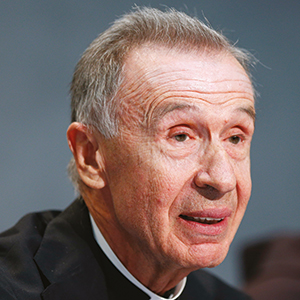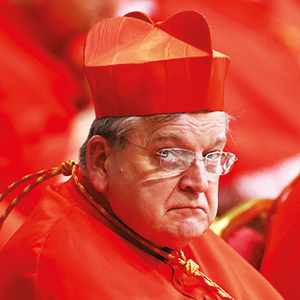WITH traditionalist Catholics ratcheting up their public challenges to his papacy, Pope Francis has made the surprise move of naming one of his most prominent cardinal critics to the Church’s top legal body.
On Saturday, Francis named Cardinal Raymond Burke (pictured), who is threatening to issue the Pope with a “fraternal correction”, as a member of the Apostolic Signatura, the Church’s supreme court, which the cardinal used to lead. Well-placed traditionalist sources in Rome say that the cardinal is refusing to retract his position that the Pope broke with church teaching in his document on family life, Amoris Laetitia, by allowing some remarried divorcees to receive communion. They say that a correction would be issued but, when pressed, could not say when, or what form it would take.
Francis’ decision last Saturday will be read as a peace offering. It comes after the Holy See’s most senior diplomat, Cardinal Pietro Parolin, called for more dialogue in the Church. This followed a “filial correction” of the Pope made by a group of priests and theologians who accused Francis of spreading heresy.
By giving Cardinal Burke a seat on the board of the church court, the Pope has drawn him closer to the papal tent, which then raises the stakes if a correction is still made. Such a step by the cardinal, who is Patron of the Order of Malta, would be divisive. Francis’ decision to appoint him to the Apostolic Signatura signals a desire for reconciliation.
According to one Rome-based expert in canon law, the notion of correcting the Pope is misleading.
Ulrich Rhode, a Jesuit priest and professor of canon law at the Pontifical Gregorian University, told The Tablet: “According to church doctrine and canon law, Prima sedes a nemine iudicatur, i.e. ‘The First See is judged by no one.’ This means, in the entire Church, any effort to formally judge the Pope – be it by a tribunal, a council, a cardinal, or by whomever – is forbidden and would not produce the intended legal effects.”
Fr Rhode pointed out than anyone had the right “to publicise their opinion”, but only if they also obeyed the “binding teachings and precepts of the legitimate authority of the Church”.
He added: “A cardinal or bishop, however, when trying to do this, has to remember his oath of fidelity to the Pope. While there are no specific norms in canon law on the question in which ways a cardinal or bishop may criticise the Pope, it is hard to imagine that this could be adequate other than in a private and confidential way.”
Last November, Cardinal Burke and three other cardinals submitted a series of questions – known as dubia – to the Pope on Amoris Laetitia,
Cardinals have been reluctant to speak publicly about the “filial correction”. Many are waiting until Cardinal Burke has released his document. Given the oaths of loyalty each cardinal makes to the Pope, any public challenge to Francis is likely to be met with a reaction. It could call into question the cardinal’s positions on the Signatura, as patron of the Knights of Malta and as a member of the Congregation for the Causes of Saints.



 Loading ...
Loading ...